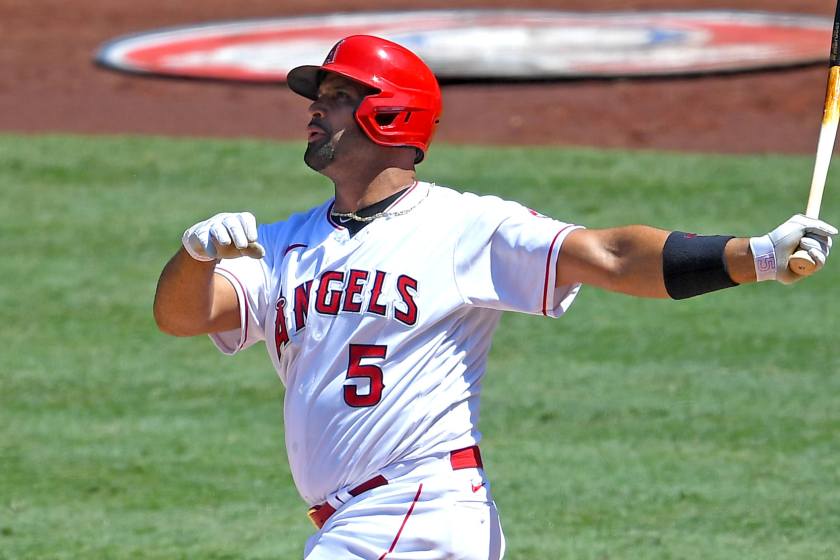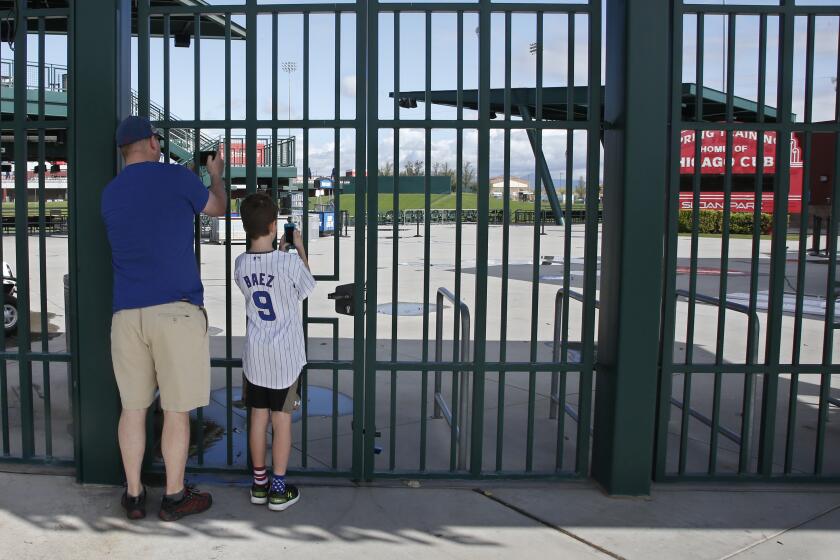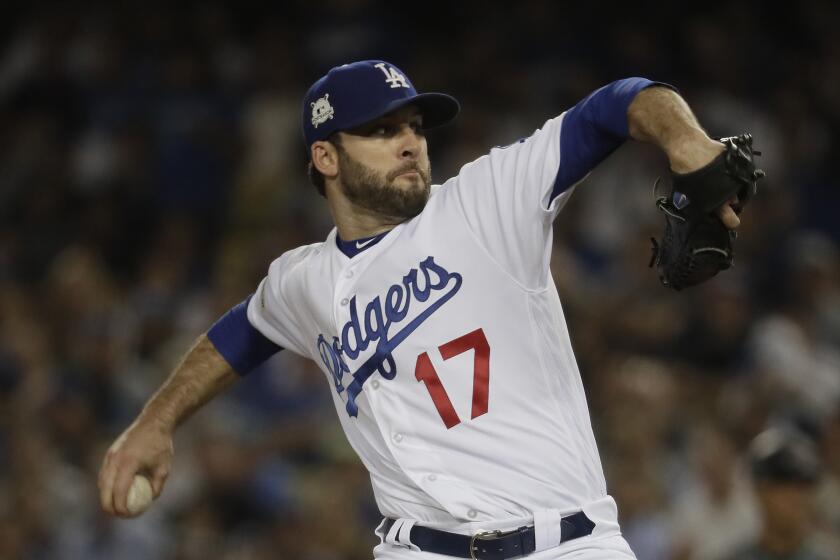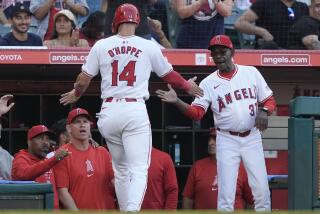Angels hope marginal adjustments will help pitchers ‘put people away’
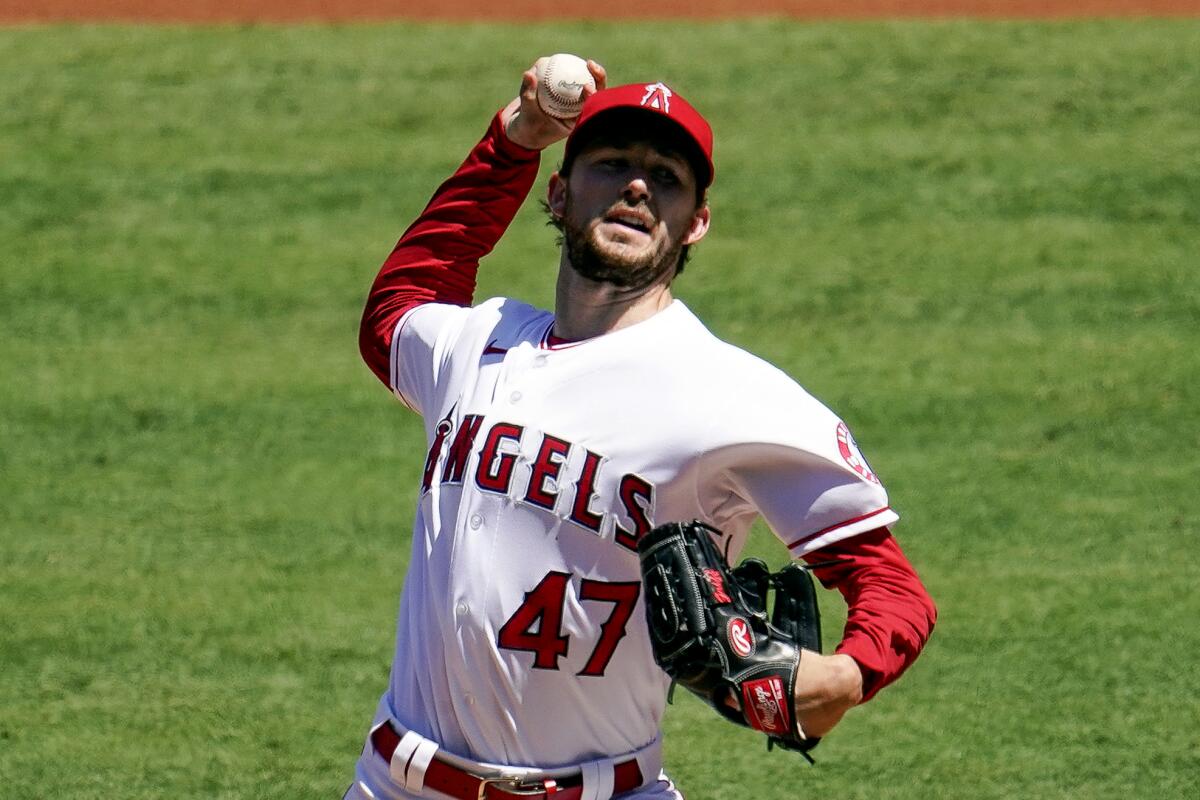
- Share via
TEMPE, Ariz. — Angels starter Griffin Canning couldn’t quite put his finger on the feeling.
Even though the Angels didn’t overhaul their pitching this offseason or add an expensive frontline starter, optimism has reigned nonetheless this spring — a budding belief that the team has the right type of talent, depth and approach to finally achieve long-sought improvements on the mound.
“I talked with [Andrew] Heaney the other day,” Canning said this week, “and we kind of feel like it’s more businesslike a little bit. Guys know what they need to get done.”
From the outside, the Angels’ staff might not look too different from the group that last season ranked 13th in the American League in ERA (5.09), 12th in home runs allowed and ninth in WHIP.
Eight of their 10 leaders in innings pitched from 2020 have returned. Their big offseason additions to the rotation, veterans José Quintana and Alex Cobb, are coming off inconsistent and injury-shortened campaigns. And while new closer Raisel Iglesias will anchor the bullpen, only three other relievers — Mike Mayers and new acquisitions Junior Guerra and Aaron Slegers — posted a sub-4.00 ERA last season.
A week after his wife indicated on Instagram this would be Albert Pujols’ final season, the Angels slugger says he hasn’t decided when he’ll retire.
Still, there are a lot of little ways the team thinks it can get better, small strides they say they have already begun to make this spring. Some of the rhetoric might sound familiar, hopeful refrains that have been repeated in springs past. They’re confident this year, however, will be different.
“I like the quality of the pitchers that we’ve got in, I like the makeup of the pitchers that we’ve gotten in,” manager Joe Maddon said. “And I think that will all play out over the course of the year.”
===
On the night they were officially eliminated from postseason contention in their third-to-last game last season, the Angels had actually built an early lead at Dodger Stadium.
But then, Dodgers catcher Will Smith hit a go-ahead home run in a two-strike count in the fifth inning. Joc Pederson and Edwin Ríos added insurance runs with two outs in the seventh and eighth, respectively. And with an eventual 9-5 loss, the Angels’ final glimmer of hope had been extinguished in a familiar way.
“The one thing that bothered me the most was the critical moments,” Maddon said of the Angels pitching struggles last season. “Two-out RBIs and two-strike pitches that I want us to get better at sequencing or knowing what to do to put people away. I didn’t think we were very good at that last year.”
It is an area Maddon has emphasized this offseason, from weekly offseason Zoom calls with his coaching staff to the early message he sent to his players in camp. He insists it’s a “doable” adjustment reliant upon better pitch calling and game management — an example of how making marginal enhancements could help the Angels maximize the talent he sees in their staff.
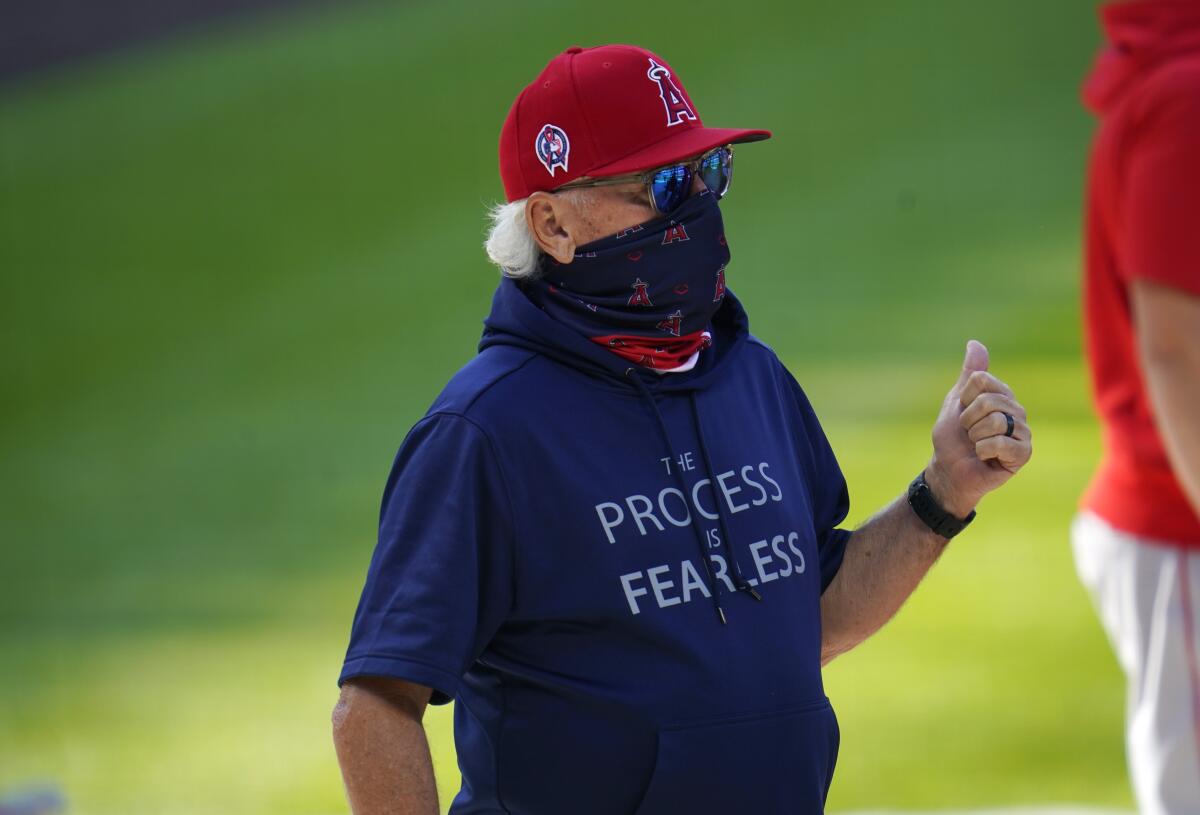
“Collectively, I think we need to work on that,” Maddon said, adding: “At the end of the day, between the pitcher and the catcher, I want them to know what they need to do in a really hot moment.”
It’s through that lens that Maddon is excited about the Angels’ offseason changes. Quintana, Cobb, Iglesias and the other host of new pitchers might not have represented the flashiest winter moves, but Maddon argued they bring depth, dependability and, perhaps most importantly, intangible qualities that can rub off on the rest of the staff.
“These guys are great in the clubhouse,” Maddon said, having formerly managed Cobb and Quintana in his past jobs with the Tampa Bay Rays and Chicago Cubs, respectively. “They are winners. They will set the proper example.”
Examples such as: How to best utilize an arsenal (despite his below-average low-90s mph fastball, Quintana made at least 31 starts each year between 2013 and 2019 with a combined 3.72 ERA); how to adapt mechanics when needed (after struggling the past three years in Baltimore, Cobb went to the renowned Driveline training center this winter to fix problematic lower-body habits he thinks he developed after undergoing Tommy John surgery in 2015); and how to be the best version of themselves on the mound.
Those are lessons that Heaney (who has posted a sub-4.00 ERA just once in his seven-year career), Canning (who is trying to replicate flashes of brilliance over an entire season) and Shohei Ohtani (who is aiming to be a full-time two-way player again after two injury-plagued seasons) could benefit from as they try to realize their full potential.
Due to COVID-19 regulations, there are fewer seats at the Cactus League, which caused spring training ticket resale prices to skyrocket.
“We need to all take a little bit of a step forward, lean on each other a little bit more,” Heaney said. “So I’m excited to do that and get to know some of these guys from different places, different backgrounds, that may have a different view on things, may have done things differently where they’ve been and pick their brain on that.”
===
Angels pitchers will have new front office voices to learn from, as well, after the arrival of new general manager Perry Minasian and assistant general manager Alex Tamin from Atlanta, where they helped the Braves develop one of the more consistent pitching staffs in baseball over the past three seasons.
“They just give you options to be successful,” said catcher Kurt Suzuki, who played for the Braves when Minasian and Tamin joined the organization three years ago. “I think sometimes you can get into that pitfall of, ‘Hey, this is the way you do it. This is how you get hitters out. And this is it.’ I believe they’re very open to ideas. … It becomes this perfect storm.”
That collaborative process is already underway with the Angels, even with pitching coach Mickey Callaway suspended pending an investigation into claims of sexual harassment and interim pitching coach Matt Wise currently limited to remote instruction after testing positive for COVID-19 last week.
Tamin has “been a pretty big part of things for the pitchers so far,” Canning said. Interim bullpen coach and special assistant Dom Chiti, who also came over with Minasian and Tamin from Atlanta, has helped out alongside the team’s other pitching coaches, too.
“The difference will be, I think, primarily in presentation,” Maddon said about the changes to pitchers’ planning and preparation this year. “Alex and the guys really are very good at taking what appears to be complex [information] and making it very simple. They’re into doing simple, better.”
The highest point of Brandon Morrow’s MLB career came with the Dodgers in 2017. The pitcher hopes to achieve even more in his second stint in L.A.
It’s fair to question how much better all these adjustments will prove to be.
Analytical projections still aren’t bullish on the Angels’ pitching (FanGraphs’ Depth Charts projections predict the team ranking in the bottom half of MLB in runs against) and several obvious questions — Will an ace emerge in the rotation? Will the middle of the bullpen hold up? Will the staff stay healthy? — still remain unanswered.
There could still be more pitching moves the Angels make before the season. The team has reportedly shown interest in free agent Jake Odorizzi, and Maddon said Saturday he and the front office are “definitely looking at all options.”
But as Cactus League play begins Sunday, the Angels think they at least have a road map to improvement this spring, that the pitching gains necessary to a postseason run aren’t beyond their grasp.
“We have a little bit more idea of what we want to be doing with our pitches, where we’re throwing them,” Canning said. “Just a little bit more organized and set on how we want to accomplish things.”
More to Read
Go beyond the scoreboard
Get the latest on L.A.'s teams in the daily Sports Report newsletter.
You may occasionally receive promotional content from the Los Angeles Times.

